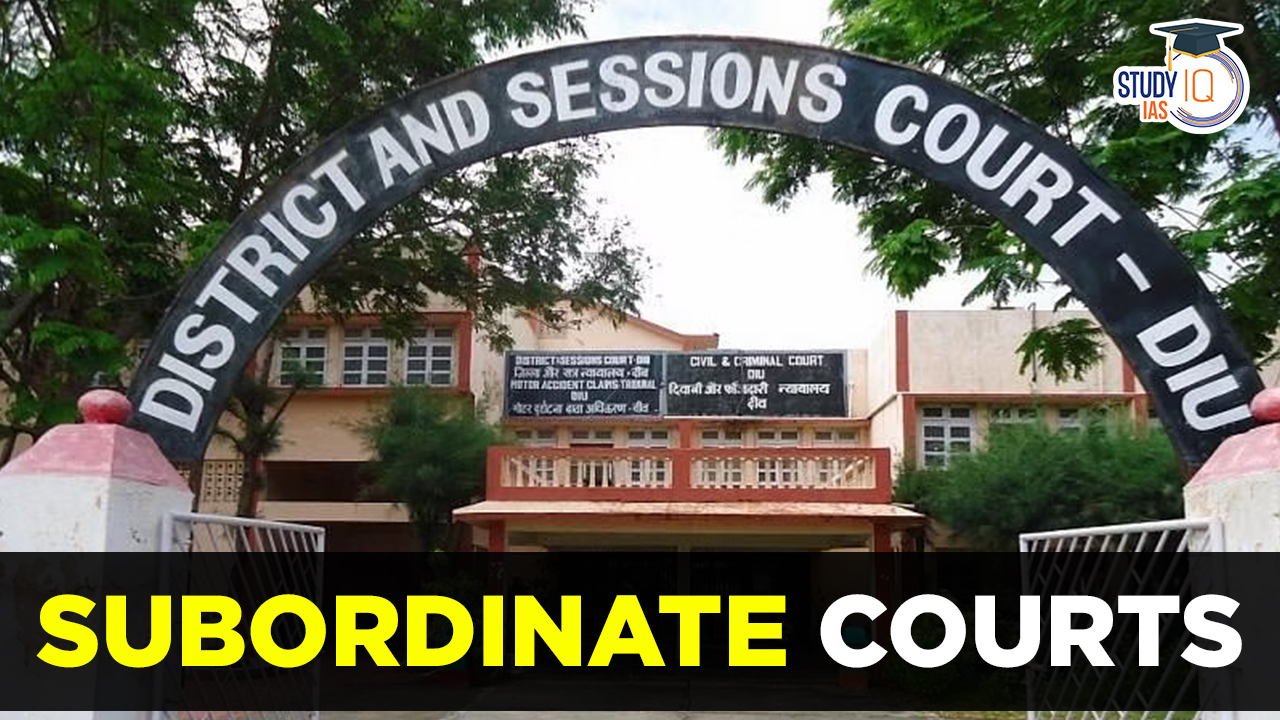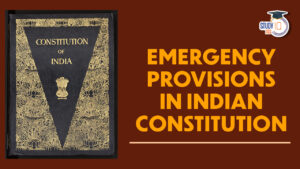Table of Contents
Subordinate Court
In India, each district has several lower courts, including civil, revenue, and criminal courts. The Constitution of India provides for these subordinate courts, which operate under the state and are supervised by the High Court. They handle different types of cases related to civil, revenue, and criminal matters. The Subordinate Courts is an important part of Indian Polity which an important subject in UPSC Syllabus. Students can also go for UPSC Mock Test to get more accuracy in their preparations.
Understanding the meaning of Subordinate Court
A Subordinate Court is a state-specific lower court that exercises jurisdiction over cases under the authority of the State High Court, as is clear from the title itself. Each state may have a different legal system. In India, there are a variety of subordinate courts that deal with different kinds of matters. A District Judge or a District and Sessions Judge decide cases in these courts.
Depending on the cases and the population in each district, a Subordinate Court could also decide matters involving more than one state. A District Court’s final judgments are additionally reviewed by the High Court’s appellate authority. The laws relating to the Subordinate Courts are mentioned in Articles 233-237 of the Sixth Amendment to the Indian Constitution.
Subordinate Courts Types
Subordinate courts are named for being under the authority of the state high court. In every district in India, there are different types of subordinate courts:
| Subordinate Courts: |
These courts manage their respective types of cases. |
Civil Subordinate Court
The Civil Court was given this name based on the kind of cases it handles. It is simple to state that a civil court considers issues involving family conflicts and disagreements, including landlord-tenant conflicts. A District Judge or a District Sessions Judge rule over a Civil Court, and in smaller family courts, they may occasionally be assisted by a Sub-Judge.
Such family problems must be resolved through civil courts. A Civil Court often does not criticise the concerned parties. The Civil Courts, which deliver judgments in accordance with the Civil Procedure Code, deal with non-criminal problems such those involving property, succession, ownership, etc.
Criminal Subordinate Court
A Criminal Court deals with criminal cases, as implied by the name. These situations entail disobedience and breaking the law, hence punishment is necessary. Typically, criminal cases involve theft, violence, murder, etc. The police typically file these lawsuits in court on behalf of the state.
A Sessions Judge or a Sessions & District Judge preside over Criminal Court. Under the Sessions Judge, a Metropolitan Judge can also be seen occasionally. If found guilty, the defendant faces harsh punishment. The Indian Penal Code and the Criminal Procedure Code are used to decide matters in the Criminal Court.
Revenue Subordinate Court
The Revenue Court is the third variety of Subordinate Courts. These courts undoubtedly handle cases involving land revenue in any state. The Board of Revenue is every district’s highest court of revenue. The final appeals are only heard by the Board of Revenue, which is the highest authority. The Tehsildars, Collectors, Tehsil Commissioners, and Naib or Assistant Tehsil Commissioners are additional authorized individuals in the Board of Revenue.
Subordinate Courts Appointment of District Judges
The Governor of the State and the High Court decide who will be appointed as a District or Sessions Judge for a Subordinate Court.
| There are a few necessary conditions for becoming a district judge, including: |
|
Subordinate Courts Articles 233 to 237
The provisions pertaining to the Indian Subordinate Courts are outlined in Part 6 of the Indian Constitution. Articles 233 through 237 of the Constitution make mention of these clauses. Let’s examine each article that relates to the subordinate judicial system.
| Article of the Constitution | Details |
| Article 233 | Pertaining to the selection of district judges |
| Article 234 | Concern over the appointment of anyone besides the District Judges |
| Article 235 | The supervision of the Subordinate Court is brought up |
| Article 236 | Discusses the interpretation |
| Article 237 | Pertaining to how the rules apply to magistrates |
Subordinate Court Functions
Since these problems do not legally violate any laws, the court does not give any sort of punishment in civil cases involving family disputes, landlord-tenant issues, etc. All cases involving major offences, such as murder, bodily assault, dacoity, etc., are heard by a criminal court. In these situations, severe sanctions and punishments are issued since they include legal infractions. The Revenue Courts deal with cases involving land revenues and take appropriate action.
Subordinate Courts Organization and Structure
The organization, authority, and names of subordinate courts are determined by each state, leading to slight differences across states. Typically, there are three levels of civil and criminal courts below the high court.
The highest authority in a district is the district judge, who has both original and appellate jurisdiction in civil and criminal matters. When handling civil cases, he is called the district judge; for criminal cases, he is the sessions judge. The sessions judge can impose sentences, including life imprisonment and the death penalty, but any death sentence must be confirmed by the High Court, regardless of appeals.
In some states, Panchayat Courts handle minor civil and criminal cases, known by various names like Nyaya Panchayat, Gram Kutchery, or Panchayat Adalat.
Conclusion
Subordinate courts are under the authority of the state’s High Court. Importantly, the High Court can take over any case from a subordinate court, even if the case is within the court’s jurisdiction. The High Court also has full control over the staff and officials of these subordinate courts.
Subordinate Courts UPSC
An essential component of the Indian judicial system is the subordinate courts. They aid in delivering justice quickly to the nation’s enormous population. As a result, the Constitution’s authors gave Subordinate Courts a significant role. From the standpoint of the IAS examination, the subject of the Subordinate Court is crucial. Students can read all the details related to UPSC by visiting the official website of StudyIQ UPSC Online Coaching.


 India Mediation Campaign, Objectives, Pr...
India Mediation Campaign, Objectives, Pr...
 Emergency Provisions in Indian Constitut...
Emergency Provisions in Indian Constitut...
 Directive Principles of State Policy (DP...
Directive Principles of State Policy (DP...





















